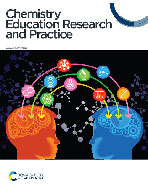Prompting hypothetical social comparisons to support chemistry students’ data analysis and interpretations
Abstract
To develop competency in science practices, such as data analysis and interpretation, chemistry learners must develop an understanding of what makes an analysis and interpretation “good” (i.e., the criteria for success). One way that individuals extract the criteria for success in a novel situation is through making social comparisons, which is often facilitated in education as peer review. In this study, we explore using a simulated peer review as a method to help students generate internal feedback, self-evaluate, and revise their data analysis and interpretation. In interviews, we tasked students with interpreting graphical data to determine optimal conditions for an experiment. Students then engaged in social comparisons with three sample responses that we constructed and compared these samples to their own. We present a model informed by social comparison theory that outlines the different processes students went through to generate internal feedback for their own analysis and response. We then discuss the different ways students use this internal feedback to determine if and how to improve their response. Our study uncovers the underlying mechanism of self-evaluation in peer review and describes the processes that led students to revise their work and develop their analysis. This work provides insight for both practitioners and researchers to leverage student's internal feedback from comparisons to self-evaluate and revise their performance.


 Please wait while we load your content...
Please wait while we load your content...